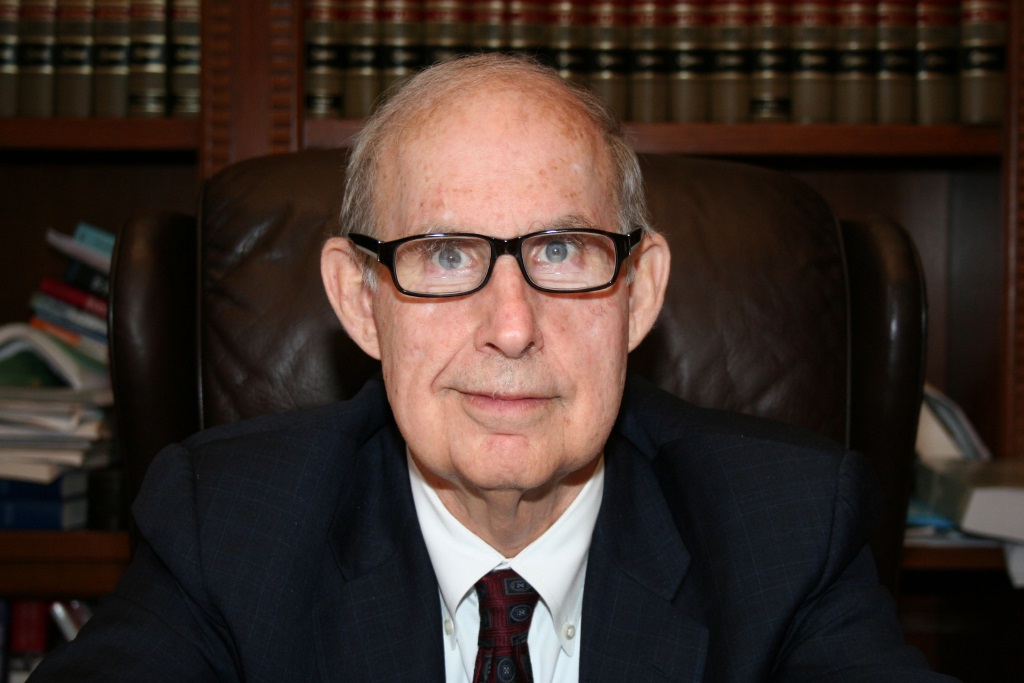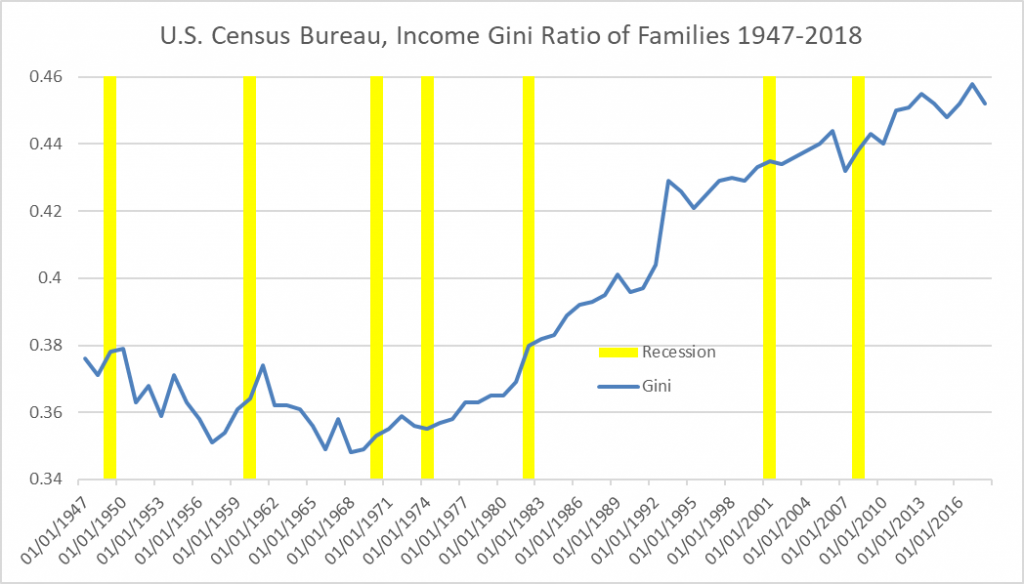Judge Adelman Blasts U.S. Supreme Court
Getting buzz nationally. Is his critique warranted?
In recent days, Milwaukee’s Federal Judge Lynn Adelman has received national attention for a powerful critique connecting the growth of inequality to U.S. Supreme Court decisions. No, it’s not about any decision by him, but because of an academic paper he authored. Entitled “The Roberts Court’s Assault on Democracy,” the paper will be published in the Harvard Law & Policy Review, the official law review of the American Constitution Society, which is sometimes viewed as the liberal answer to the conservative Federalist Society. https://papers.ssrn.com/sol3/papers.cfm?abstract_id=3540318
Over the course of 35 pages, Judge Adelman makes two arguments about decisions by the U.S. Supreme Court under Chief Justice John Roberts:
- That, taken together, they constitute “a direct assault on the right of poor people and minorities to vote,” and
- That “they have unfailingly increased the economic and political power of corporations and wealthy individuals and reduced that of ordinary Americans.”
As if this provocation was not enough coming from a federal judge, consider Adelman’s opening sentence:
By now, it is a truism that Chief Justice John Roberts’ statement to the Senate Judiciary Committee that a Supreme Court justice’s role is the passive one of a neutral baseball umpire who [merely] calls the balls and strikes” was a masterpiece of disingenuousness.
Indeed, others have come to the same conclusion. Consider this March 11, 2020 letter from James Dannenberg to Chief Justice Roberts resigning from the Supreme Court bar. Dannenberg is a retired Hawaii state judge, Hawaii deputy attorney general, and law school teacher.
You are doing far more— and far worse– than “calling balls and strikes.” You are allowing the Court to become an “errand boy” for an administration that has little respect for the rule of law.
Dannenberg goes on to say that the Court is “willfully hurtling back to the cruel days of Lochner”—the court’s decision to overturn a New York rule to limit bakers’ working hours to 80—”and even Plessy”—the decision upholding segregation.
Although the causes of growing inequality are hard to separate, Judge Adelman makes a plausible case that the US Supreme Court played a role. Consider the following paragraph:
While it may be arbitrary to assign a date to the beginning of the shift toward the concentration of wealth, and political power, one could do worse than point to the year 1971. In that year, just two months before he was appointed to serve as a Supreme Court justice, Lewis Powell, then counsel to the U.S. Chamber of Commerce, wrote a now infamous memorandum to leader of the Chamber arguing that the American economic system was under attack and that the Chamber and American corporations needed to respond by becoming much more politically aggressive. Reacting to the egalitarian legislation enacted in the 1960s, to decisions of the Warren Court, and to the social upheavals of the same decade, Powell argued that business had to organize and engage in coordinated political activity. He also asserted that the courts “may be the most important instrument for social, economic and political change” and that they “offered a vast area of opportunity for the Chamber.”
The graph below shows the Gini index, the most commonly used measure of inequality, between 1947 and 2018. The index varies between zero—if everyone got the same income—and one—in which all income went to a single family. Consistent with the Adelman thesis, inequality hit bottom sometime around 1971 and has been increasing ever since.
It’s important to point out that correlation does not prove causality. Just because inequality started growing following the Powell memo does not prove that the Supreme Court’s decisions were the cause. Adelman’s contribution is to add the conservative justices to the list of suspects.
He does this with considerable discussion of those cases. On his first point, that the court has reduced the voting rights of poor people and minorities, he refers to a series of decisions that gutted the Voting Rights Act. As a result, he concludes, states were given free rein to use a variety of strategies—including gerrymandering, barriers to registering and voting, or purging voter lists, aimed at reducing the influence of minority and low-income voters.
In addressing the second issue, that the court has contributed to economic and political inequality, Adelman runs through the series of campaign finance decisions that have collectively allowed wealthy people and corporations to spend unlimited funds to influence elections, while gutting most attempts to control these expenditures. In addition, he brings in other decisions that shift the balance of power, These included striking down a law prohibiting pharmacies from selling prescription data without the permission of the doctor, a decision weakening public sector unions, and another decision upholding mandatory arbitration in employment disputes, among others.
Adelman’s paper has received considerable coverage in the national press, including the Milwaukee Journal Sentinel, the Washington Post, CNN, The Hill, and Esquire, presumably reflecting the novelty of a federal judge criticizing the Chief Justice. Yet none addressed the substance of Adelman’s argument.
So far, I have been able to identify four responses coming from the right: from Fox News, the Daily Signal (a publication of the Heritage Foundation), the reliably conservative Washington Examiner, and a post on The Volokh Conspiracy (currently hosted by Reason magazine).
The authors of these responses range from right-wing crackpot to respectable right-wing ideologue. None of these authors are happy with Adelman’s article but they prefer to attack him personally rather than engage the substance of his argument.
The crackpot role is ably played by “Fox News legal analyst and commentator” Gregg Jarrett, who describes Adelman as “a biased liberal flamethrower.” Fox News describes Jarrett as “the author of the No. 1 New York Times best-selling book ‘The Russia Hoax: The Illicit Scheme to Clear Hillary Clinton and Frame Donald Trump.’ His latest book is the New York Times bestseller ‘Witch Hunt: The Story of the Greatest Mass Delusion in American Political History,’” in which “Jarrett reveals the shocking story of how former FBI Director James Comey—whom he calls ‘the schemer-in-chief’—initiated the investigation without evidence, broke a myriad of government rules, duped or defrauded the FISA court with a sham dossier, and ambushed Trump and tried to entrap him.”
The role of ideologue is filled by Josh Blackman on the Volokh Conspiracy (the site is self-described as “Mostly law professors | Sometimes contrarian | Often libertarian | Always independent”). Blackman teaches law at the South Texas College of Law Houston and, according to the New York Times, is “a strong supporter of the Trump approach” to making sure that nominees for the federal bench “come with rock-solid conservative résumés.”
The next day Blackman continued his attack: He noted Adelman’s interview with The Washington Post Tuesday, where he was unapologetic, saying:. “I think it’s totally appropriate to criticize the court when there’s a basis for it. Judges are encouraged to comment on the law because we have a particular interest, knowledge and familiarity.”
“I think Judge Adelman is referring to comment [2] to Rule 2.1 of the ABA Model Code of Judicial Conduct,” Blackman writes and then proceeds to show that ABA Rule 2.1 is irrelevant to the issue. Except that Blackman is wrong: federal judges are subject to the Code of Conduct for United States Judges, not the ABA Model Code. As a self-described constitutional lawyer, surely Blackman should know this.
And contrary to Blackman’s assertion, it appears Judge Adelman was referencing Canon 4 of the federal code. It states in part:
A judge may engage in extrajudicial activities, including law-related pursuits and civic, charitable, educational, religious, social, financial, fiduciary, and governmental activities, and may speak, write, lecture, and teach on both law-related and nonlegal subjects.
Adelman’s article would appear to fit comfortably within this guideline.
It is clear that Blackman doesn’t like Judge Adelman’s conclusion although he offers little in the way of substantive criticism. Instead of a reasoned response, he accuses Adelman of “abusing his office.”
The article in the Washington Examiner takes Blackman a step further. Extensively quoting Blackman, it is headlined, “Judge who blasted Trump and Supreme Court must be punished for unprofessional behavior.”
Should judges have free speech rights? I believe they should. If another judge wished to respond to Adelman’s article, he or she should have that right as well. A much more worrisome trend, I think, is the increasing tendency for judges to slip opinion pieces into court decisions under the guise of dissents or concurrences. Justice Clarence Thomas has done this for years, a practice that has been picked up by a number of Trump judges, documented in a recent Slate article.
Unfortunately, this practice has been picked up by at least two Wisconsin Supreme Court justices. Justices Rebecca Bradley and Daniel Kelly, the incumbent in the April Supreme Court election, often include dissents or concurrences that do nothing to advance the particular case involved, but offer a chance to expound on some vaguely connected issue, such as political correctness or administrative agencies. They should follow Judge Adelman’s lead and turn them into articles and stop junking up the decisions.
Data Wonk
-
Life Expectancy in Wisconsin vs. Other States
 Dec 10th, 2025 by Bruce Thompson
Dec 10th, 2025 by Bruce Thompson
-
How Republicans Opened the Door To Redistricting
 Nov 26th, 2025 by Bruce Thompson
Nov 26th, 2025 by Bruce Thompson
-
The Connection Between Life Expectancy, Poverty and Partisanship
 Nov 21st, 2025 by Bruce Thompson
Nov 21st, 2025 by Bruce Thompson
























Thank you for this thoughtful piece!
Thank you for this thoughtful and thought-provoking piece!